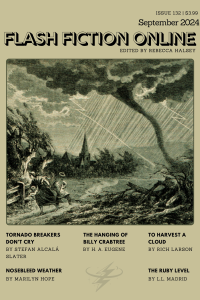Ian Mond Reviews Other Worlds: Peasants, Pilgrims, Spirits, Saints by Teffi
 Other Worlds: Peasants, Pilgrims, Spirits, Saints, Teffi (NYRB Classics 978-1-68137-539-7, $17.95, 256pp, tp) April 2021.
Other Worlds: Peasants, Pilgrims, Spirits, Saints, Teffi (NYRB Classics 978-1-68137-539-7, $17.95, 256pp, tp) April 2021.
New York Review Books’ publication of Other Worlds: Peasants, Pilgrims, Spirits, Saints continues a rediscovery of Teffi’s short fiction that began with the Pushkin Press release of Subtly Worded back in 2014. I should note that before picking up a review copy of Other Worlds, my interest piqued by references to the occult and “ancient Slavic Gods,” I had never heard of Teffi and was unaware that her work was in need of revival. In fact, I initially confused the name with British author Saki who, ironically, Teffi’s satirical work has been compared to (they were also contemporaries). Now that I’ve finished Other Worlds, which collects 25 stories inspired by Russian religious customs and folklore, I feel this almost evangelical need to spread my love of Teffi to anyone within shouting distance.
Born in Russia in 1872, Teffi was the pseudonym for Nadezhda Lokhvitskaya. For the first two decades of the 20th century, her literary star burnt bright, the Russian public in love with her satirical sketches and short stories of contemporary life. Then came the October Revolution, and while Teffi initially supported the Bolsheviks, that quickly waned, and she left Russia, eventually settling in France. This began the second phase of Teffi’s career. According to Maria Bloshteyn (Los Angeles Review of Books), Teffi remained a “literary A-lister, filling concert halls in Paris with Russian emigres eager to hear her read.” Most of the fiction that appears in Other Worlds was written during this period. Unlike her satirical stories so adored by Tsarist Russia, these pieces eschew the contemporary for an old Russia bound by superstition and fearful of spirits, witches, devils, and shapeshifters.
Other Worlds, though, begins with a series of stories informed by Teffi’s faith. As Robert Chandler points out in his enlightening Foreword, “Teffi was a practising member of the Russian Orthodox Church. Both Orthodox Christianity and Russian folk religion, with its often poetic understanding of spiritual matters, were important to her.” In stories like “Kishmish” and “Confession”, which are both set during Lent and told from the perspective of a young girl (likely stand-ins for Teffi), she articulates the awe and irrational fear religion can instill in a child. “Kishmish”, in particular, has an incredible opening where the young protagonist, tucked up in bed, is frightened by a church bell calling parishioners to prayer.
Who knows what this sound might not be? It is sinister. If anguish and fear could be translated into sound, this is the sound they would make. If anguish and fear could be translated into colour, it would be this uncertain murky grey.
In contrast, “Solovki” is a piece about religious ecstasy. It deals with the punitive aspects of organised religion – a husband forces his wife on pilgrimage to do penance for having an affair – but the final paragraphs, where the wife enters the church and is possessed by the Holy Spirit, are extraordinary, a visceral and moving depiction of spiritual bliss.
The more fantastic stories, inspired by Slavic folklore and superstition, appear about a quarter of the way through the collection. In the atmospheric and moody “Shapeshifter”, a young woman journeys to a small, snow-swept town to meet her beloved and instead spends her evening with a gentleman who may, or may not, be a were-creature. The chilling “Witch” tells the tale of a husband and wife who grow increasingly afraid of their maid, suspected of dabbling in witchcraft. “Vurdalak” (the Slavic word for vampire), one of several stories named after a creature or spirit from Russian folklore, is about a “monstrous baby” who sucks the life-force from his ne’er-do-well uncle after biting the older man on the neck. The heartfelt, tragic “House Spirit” involves a “Domovoy” or household god who does everything in its limited power to protect a young girl from her abusive father. I was also blown away by “The Kind That Walk”, a zombie tale (and one of the best I’ve ever read) that turns out to be a razor-sharp, passionate attack on anti-semitism.
The only story to top “The Kind That Walk” is the extraordinary “The Dog”, one of the few pieces set in the 20th century. The tale, told to us by an older woman recalling the unusual murder of a man named Edvers, is one of unrequited love, Bohemian poets, the Revolution, and a supernatural dog with a savage bite. While the story is very much Teffi’s angry response to the Bolsheviks and, more specifically, to quote Chandler, “the Bohemian abandonment of traditional moral values [paving] the way for the brutalities and duplicities of Communism,” it also displays everything that I’ve come to love about Teffi, her use of imagery, her memorable characters, and most of all her skill as a story-teller.
As sublime as all the stories are, they are enhanced by the additional material included in the book. I’ve already noted Chandler’s terrific Foreword, but many of the stories are also annotated, providing helpful explanations regarding the folk traditions Teffi drew from. There’s also an eye-opening short essay on the challenges of translating Teffi, which shines a much-needed light on the complex and delicate art of translation. Teffi’s literary star might have dimmed since she died in 1952, but with Pushkin Press’ Subtly Worded and now the truly wonderful collection Other Worlds: Peasants, Pilgrims, Spirits, Saints, she is finding a new audience in once ignorant readers like myself.
This review and more like it in the June 2021 issue of Locus.
 While you are here, please take a moment to support Locus with a one-time or recurring donation. We rely on reader donations to keep the magazine and site going, and would like to keep the site paywall free, but WE NEED YOUR FINANCIAL SUPPORT to continue quality coverage of the science fiction and fantasy field.
While you are here, please take a moment to support Locus with a one-time or recurring donation. We rely on reader donations to keep the magazine and site going, and would like to keep the site paywall free, but WE NEED YOUR FINANCIAL SUPPORT to continue quality coverage of the science fiction and fantasy field.
©Locus Magazine. Copyrighted material may not be republished without permission of LSFF.





